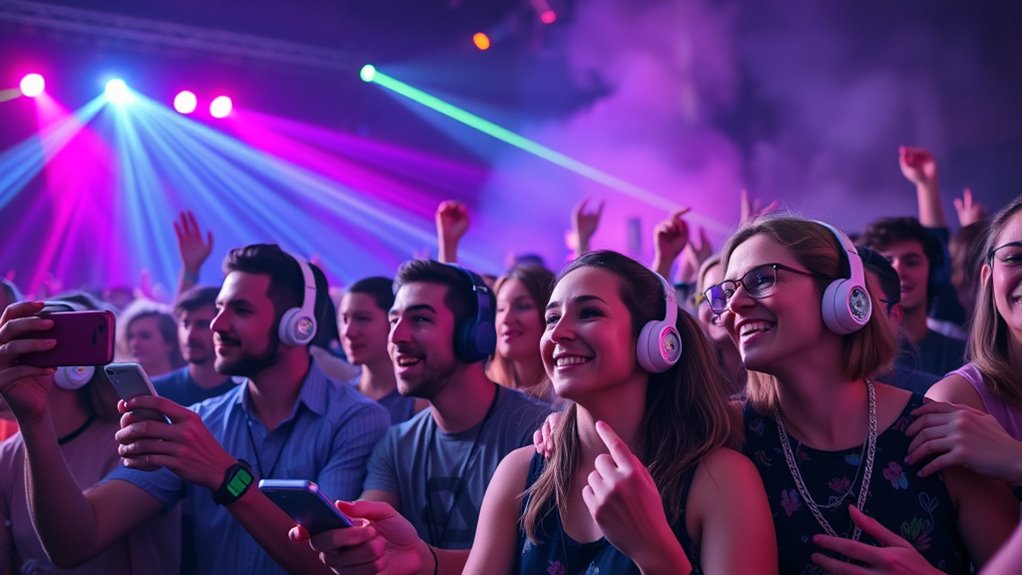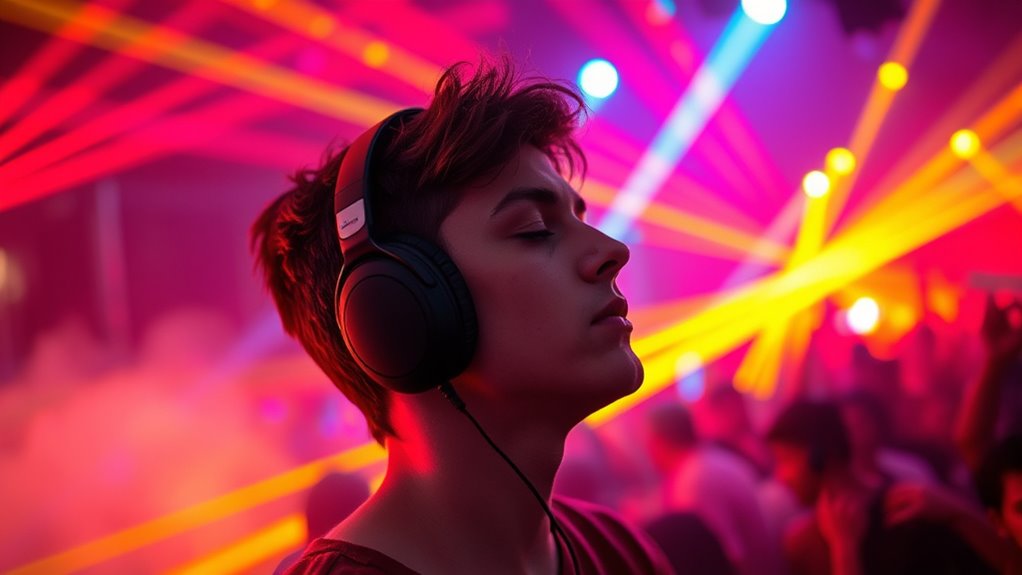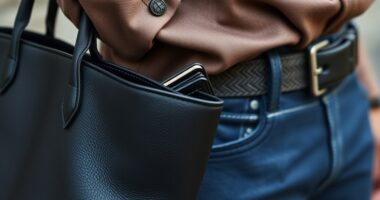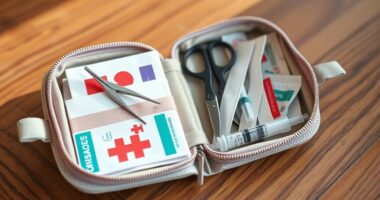To enjoy loud music safely, keep the volume around 60% of your device’s maximum and limit listening sessions to 1-2 hours. Take regular breaks to give your ears time to recover and consider using noise-canceling headphones to avoid turning up the volume. Wearing ear protection at concerts or loud events also helps prevent damage. Careful habits now can preserve your hearing health for years to come—there’s more to learn about protecting your ears effectively.
Key Takeaways
- Keep device volume around 60% and limit listening sessions to 1-2 hours.
- Use noise-canceling headphones to enjoy music at lower volumes safely.
- Take regular breaks during listening to give your ears time to rest.
- Wear ear protection in loud environments like concerts and sports events.
- Schedule periodic hearing checkups to monitor and protect your hearing health.

Have you ever considered how essential your hearing is to daily life? It’s your connection to the world around you, allowing you to enjoy music, hold conversations, and stay aware of your environment. Whether you’re at a concert, listening to your favorite playlist, or just chatting with friends, your ears work hard to keep you engaged. But with all the loud sounds we encounter daily—especially in today’s noisy world—preserving your hearing requires awareness and caution. Enjoying music loudly might seem harmless in the moment, but it can have lasting effects if you’re not careful.
Many people underestimate how quickly loud music can damage their hearing. Listening to music through headphones or at concerts at high volumes can cause irreversible damage over time. The key is to find a balance between enjoying your favorite tunes and protecting your ears. One common mistake is turning up the volume to drown out background noise, but that only increases the risk of harm. Instead, try setting your device’s volume to a safe level—generally, 60% of the maximum volume—and take breaks every hour to give your ears a rest. Using noise-canceling headphones can also help because they block out background noise, so you don’t feel compelled to crank up the volume.
Listening at 60% volume and taking breaks protects your hearing over time.
Another important tip is to be mindful of the duration you spend listening to loud sounds. Even if the volume isn’t maxed out, extended exposure can still cause damage. Limit your listening sessions to no more than an hour or two at a time, and give your ears time to recover afterward. If you notice any ringing or muffled hearing after listening, it’s a sign to lower the volume or take a break. Paying attention to these cues helps you catch potential problems early and prevents long-term harm. Protecting your hearing health now can help prevent age-related hearing issues later in life.
While it’s tempting to indulge in loud music, remember that your hearing health is an investment in your future. Regularly using ear protection at concerts, sporting events, or when working with loud machinery can considerably reduce your risk of hearing loss. Earplugs are small, affordable, and effective—wear them whenever you’re in a loud environment. And don’t forget to schedule regular hearing checkups, especially if you notice any changes in your hearing ability. The sooner you catch issues, the better your chances of preserving your hearing.
Enjoying loud music isn’t inherently bad, but it requires moderation and responsibility. By controlling your volume, limiting listening time, and protecting your ears, you can continue to enjoy your favorite sounds without risking your hearing health. Your ears are delicate, and safeguarding them now ensures you’ll keep experiencing the richness of sound for years to come.
Frequently Asked Questions
How Can I Tell if My Hearing Is Already Damaged?
You might notice ringing or buzzing in your ears after loud events, which signals possible damage. Difficulty hearing conversations or needing to turn up volume on devices more than usual also indicate issues. If sounds seem muffled or you struggle to hear high-pitched noises, your hearing could be affected. Regular check-ups with an audiologist can confirm your hearing health. Don’t ignore early signs—taking action now protects your hearing long-term.
Are There Specific Ear Protection Devices for Concerts?
Yes, there are specialized ear protection devices for concerts designed to save your hearing from certain destruction. These include high-fidelity earplugs that reduce volume evenly, so you can still enjoy the music without risking damage. You might also find musicians’ earplugs or custom-molded options. Protecting your ears now could prevent the heartbreaking loss of your favorite sounds forever. Don’t wait—your future self will thank you for choosing safety today.
How Long Should I Listen to Loud Music Safely?
You should limit your exposure to loud music to no more than 15 minutes at a time if the volume exceeds 85 decibels. To protect your hearing, use earplugs or noise-canceling headphones, and take breaks every 15-30 minutes. Keep the volume at a moderate level, and be mindful of how loud it feels. Consistently listening to loud music can cause permanent hearing damage over time.
Can Hearing Damage Be Reversed if Caught Early?
Yes, catching early signs of hearing trouble can help you take steps to prevent further issues. While some damage might be difficult to fully undo, addressing the problem early can preserve your hearing health and reduce future risks. You should see a professional if you notice any changes, like muffled sounds or ringing. Taking prompt action keeps your ears in the best shape possible, ensuring you enjoy your favorite tunes longer.
What Are the Signs of Temporary Hearing Loss?
You might experience temporary hearing loss if you notice muffled sounds, ringing or buzzing in your ears, or difficulty understanding speech after exposure to loud noise. You may also feel a sense of fullness or pressure in your ears. These symptoms usually improve within a few hours or days. If you notice these signs, it’s important to give your ears a break and avoid loud environments to prevent lasting damage.
Conclusion
Think of your ears as delicate gardens, thriving only when cared for properly. When you listen to loud music without protection, it’s like exposing these gardens to harsh storms—initially exciting but ultimately damaging. By guarding your hearing, you’re nurturing a vibrant landscape that can flourish for years. So, enjoy your music, but remember: keeping the volume in check is like tending your garden with gentle hands—ensuring beauty and harmony stay forever.










